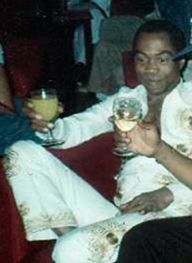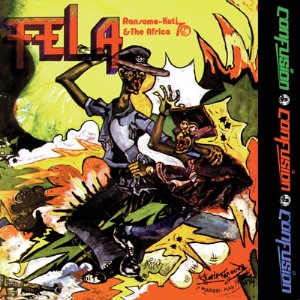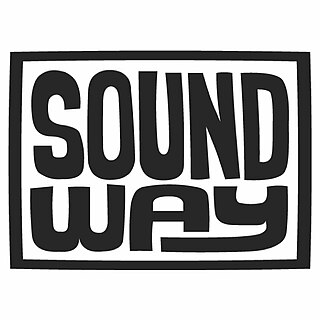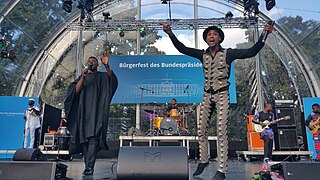
Afrobeat is a West African music genre, fusing influences from Nigerian and Ghanaian music, with American funk, jazz, and soul influences. With a focus on chanted vocals, complex intersecting rhythms, and percussion, the style was pioneered in the 1960s by Nigerian multi-instrumentalist and bandleader Fela Kuti, who popularised it both within and outside Nigeria. At the height of his popularity, he was referred to as one of Africa's most "challenging and charismatic music performers."

The music of Nigeria includes many kinds of folk and popular music. Little of the country's music history prior to European contact has been preserved, although bronze carvings dating back to the 16th and 17th centuries have been found depicting musicians and their instruments. The country's most internationally renowned genres are Indigenous, Apala, Aurrebbe music, Rara music, Were music, Ogene, Fuji, Jùjú, Afrobeat, Afrobeats, Igbo highlife, Afro-juju, Waka, Igbo rap, Gospel, Nigerian pop and Yo-pop. Styles of folk music are related to the over 250 ethnic groups in the country, each with their own techniques, instruments, and songs.

Fela Aníkúlápó Kútì was a Nigerian musician and political activist. He is regarded as the principal innovator of Afrobeat, a Nigerian music genre that combines West African music with American funk and jazz. At the height of his popularity, he was referred to as one of Africa's most "challenging and charismatic music performers". AllMusic described him as "a musical and sociopolitical voice" of international significance.

African popular music, can be defined as any African music, regardless of genre, that uses Western pop musical instruments, such as the guitar, piano, trumpet, etc. Afropop is a genre of music that combines elements from both African traditional music with Western pop music, characterized by the use of African rhythms and melodies, as well as western instrumentation and production techniques. Like African traditional music, Afropop is vast and varied. Most contemporary genres of western popular music build on cross-pollination with traditional African American and African popular music. Many genres in popular music of rock, metal, pop, blues, jazz, salsa, zouk, and rumba derive, of varying degrees, musical traditions from Africa cultured to the Americas, by enslaved Africans. These rhythms and sounds have subsequently been adapted by newer genres like hip-hop, and R&B. Likewise, African popular music have adopted Western music industry recording studio techniques. The term does not refer to a specific style or sound but is used as a general term for African popular music.

Antibalas is an American, Brooklyn-based afrobeat band founded in 1998 by Martín Perna. Initially inspired by Fela Kuti's Africa 70 band and Eddie Palmieri's Harlem River Drive Orchestra, the music generally follows the musical architecture and language of afrobeat and incorporates elements of jazz, funk, dub, improvised music, and traditional drumming from Cuba and West Africa.

Tony Oladipo Allen was a Nigerian and French drummer, composer, and songwriter who lived and worked in Paris, France. Allen was the drummer and musical director of Fela Kuti's band Africa '70 from 1968 to 1979, and was one of the founders of the Afrobeat genre. Fela once stated that "without Tony Allen, there would be no Afrobeat". He was described by Brian Eno as "perhaps the greatest drummer who has ever lived". Later in life, Allen collaborated with Damon Albarn on several projects, including Gorillaz, the Good, the Bad & the Queen and Rocket Juice & the Moon.
Afro rock is a style of rock music with African influences. Afro rock is a dynamic interplay between Western rock music and African musical elements such as rhythm, melodies and instrumentation. Afro rock bands and artists in the late 1960s and early 1970s included Osibisa, Assagai and Lafayette Afro Rock Band.

Chopteeth is a Washington, D.C.–based afrofunk big-band. Although rooted in Fela Kuti's Nigerian afrobeat, Chopteeth's music is an amalgam of Ghanaian highlife, Senegalese rumba, Jamaican ska, Mande griot music, 1970's West African funk, Ewe dance drum rhythms, Kenyan Taita afropop, soul-funk, and jazz. Chopteeth's writing and arrangements feature unique driving syncopations, and occasional odd meters. Chopteeth vocalists sing in eight different languages including English, Nigerian Pidgin, Swahili, Wolof, Mande, Twi, Taita, and French.

Kokolo, also known as the Kokolo Afrobeat Orchestra, is an American Afrobeat band from the Lower East Side of New York City, formed in 2001 by songwriter/producer Ray Lugo.
Gbedu literally means "big drum" and is a percussion instrument traditionally used in ceremonial Yoruba music in Nigeria and Benin. More recently, the word has come to be used to describe forms of Nigerian Afrobeats music.

Confusion is a 1975 album by Nigerian Afrobeat musician Fela Kuti and his Africa 70 band. It was arranged, composed, and produced by Kuti, who recorded the album after choosing to emphasize his African heritage and nationalism in his music. Confusion is a commentary on the confused state of post-colonial Lagos and its lack of infrastructure and proper leadership at the time. Kuti's pidgin English lyrics depict difficult conditions in the city, including a frenetic, multilingual trading market and inextricable traffic jams in Lagos' major intersections.

Sorrow Tears and Blood is an album by Nigerian Afrobeat composer, bandleader, and multi-instrumentalist Fela Kuti. It was recorded in 1977 and originally released on the Nigerian Kalakuta label.

Shakara is an album by Nigerian Afrobeat composer, bandleader, and multi-instrumentalist Fela Kuti, recorded in Lagos in 1971 and originally released on the Nigerian EMI label.

Afrodisiac is an album by Nigerian Afrobeat composer, bandleader, and multi-instrumentalist Fela Kuti, originally released on the Nigerian EMI label in 1973. The album's four tracks were re-recordings of Nigerian 45s redone in London in 1972. The album features Kuti's first Nigerian hit "Jeun Ko Ku," which sold over 200,000 copies.

Franck Biyong is a Cameroonian musician, bandleader and record producer. He plays the electric guitar, bass as well as percussion and keyboards. Biyong is the creator of the "Afrolectric" genre, which melds Afrobeat, jazz, and electronic funk. As of 2024, he has released 20 albums.

Soundway Records is a British, London-based independent record label, founded and run by English DJ and music producer Miles Cleret. Since its initial release of a collection of Ghanaian music in 2002, it has released compilation albums of African, Caribbean, Latin, and Asian music from the 1950s to 1980s.

Bantu is a 13-piece band based in Lagos, Nigeria. Their music is a fusion of Afrofunk, Afrobeat, highlife and Yoruba music. The group features multi-instrumentalists and singers who perform as a collective.
Blo was a Nigerian psychedelic funk ensemble formed in Lagos and active between 1972 and 1982. The main trio consisted of Laolu "Akins" Akintobi (drums), Berkely "Ike" Jones (guitar), and Mike "Gbenga" Odumosu (bass). The group fused the Afrobeat rhythms of Nigeria with funk and psychedelia derived from '60s Western rock music.

Everybody Get Agenda is the sixth studio album by Bantu, released on September 23, 2020, on Soledad Productions. Like their previous album Agberos International, this long player was composed and written by all members of the band. It was recorded in Lagos, Nigeria and mixed in Cologne, Germany. The music style is Afrofunk and Afrobeat with elements of Yoruba music, Soul, Jazz and Rap.
















